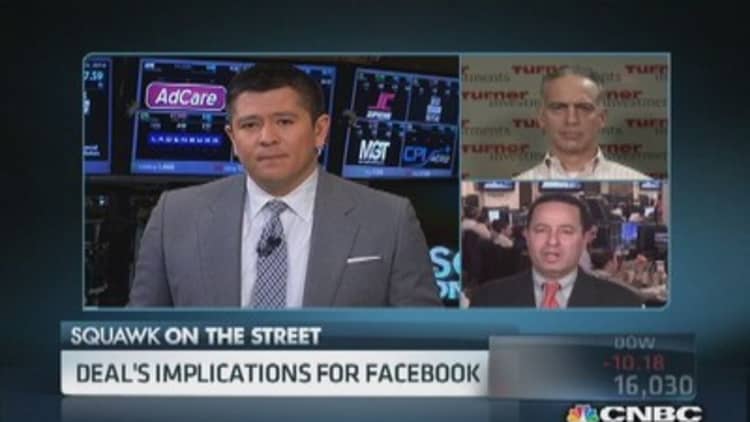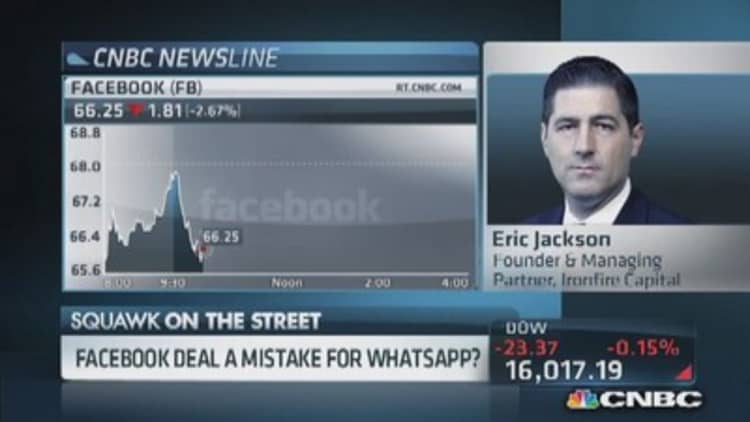
Social media collectively balked at the $16 billion price tag attached to the deal between Facebook and WhatsApp, which was announced Wednesday. A few years from now, however, investors could view it the same way they do Facebook's acquisition of Instagram in 2012, the founder of Ironfire Capital told CNBC on Thursday.
Facebook's $1 billion purchase of the photo-sharing service now looks like one of the best and cheapest Internet transactions in recent history, said Eric Jackson, who last year recommended that the founders of WhatsApp resist selling the company.
The WhatsApp deal could follow suit, he said, but on a much bigger scale. Think billions instead of millions.
"It's silly to look backward and say, 'Hey, this is only a company that made $28 million last year, how can we justify this price?' " Jackson said on "Squawk on the Street." "A few years from now, this is ... a service with at least a billion, maybe 2 billion users, and what you could monetize with that is huge."

Analysts value social media companies based on their price per monthly active user. WhatsApp, a free text-messaging service with about 55 employees and a $1 per year service fee, looks primed to explode to 1 billion users from the current 450 million as early as next year, several analysts told CNBC on Thursday.
Using the $19 billion deal price, which accounts for restricted stock units, that works out to $42 per user, according to Brian Nowak, a senior analyst at Susquehanna International Group.
(Read more: Facebook buys WhatsApp: A desperate move?)
So, though the selling price may seem outrageous, it's based on WhatsApp's massive (and growing) user base. In the context of per-user pricing, the tab doesn't seem that far off what Google paid for YouTube, or Facebook for Instagram, Nowak said.
In contrast, Twitter is valued at about $150 per user, Facebook at $140 and LinkedIn at $120, according to Robert Peck, an Internet analyst at SunTrust Robinson Humphrey, who appeared earlier on CNBC's "Squawk Box."
(Read more: Why WhatsApp's $16B price tag makes sense)
"Nineteen billion is a big number, but the other big number is 450 million people on WhatsApp," Nowak said. "That is rarefied air."
He noted that only five other online platforms have that many users—Google, Facebook, Yahoo, Microsoft and Wiki—and none of them are for sale.
WhatsApp also seems busier than other social networks. Some 70 percent of its users send messages every day, and the company says it's adding 1 million users daily. WhatsApp could ask for a valuation of $50 per monthly active user over time, said Youssef Squali, head of Internet and media equity research at Cantor Fitzgerald & Co.
"If I'm talking a year from now and they have a billion users, I think this is going to be a home-run deal," he told "Squawk on the Street." "That to me is the clear part about this."

Jon Steinberg, the COO of BuzzFeed and a CNBC contributor, said Facebook investors should know that CEO Mark Zuckerberg made a "very smart move and very expensive move."
Facebook could easily monetize WhatsApp because of its large user base and rapid growth in international messaging, he said Thursday, describing the start-up as the "phone company of the future."
(Re/code: The big winners in the WhatsApp deal)
Since integrating WhatsApp into BuzzFeed's mobile platform in October, usage has doubled and overtaken Twitter as a way to share content, Steinberg told CNBC.
"It doesn't take that much to monetize something that big," he said on "Squawk on the Street." "There are so many ways that, with an audience that big, these guys can print money."
(Poll: Facebook's buy of WhatsApp: Crazy, desperate money?)
Social media companies have to move quickly to take advantage of trends, and that means disrupting themselves if necessary, Steinberg said. Zuckerberg decided to use about 10 percent of Facebook's market value to shake things up, something the CEO will have to do repeatedly, he added.
Investors "should be concerned about how expensive it was, but they should feel good that they're invested in a stock where the founder is willing to do the boldest of moves in a world that changes so rapidly," he said. "I stick with Zuckerberg here."
—By CNBC's Jeff Morganteen. Follow him on Twitter at @jmorganteen and get the latest stories from "Squawk on the Street."


